BECOSAN® provides professional automotive flooring solutions across the UK, designed specifically for dry areas within manufacturing plants, logistics centres, and vehicle showrooms.
Our polished concrete system transforms ordinary concrete slabs into durable, dust-free and easy-to-maintain floors that meet the demanding standards of the automotive industry. Whether in a new facility or an existing one, BECOSAN® delivers a long-lasting surface that resists wear, enhances appearance and reduces maintenance costs.
Unlike coatings such as epoxy or polyurethane, our treatment hardens and seals the concrete itself — it doesn’t peel, crack or need reapplication. For automotive environments without constant exposure to water, oils or aggressive chemicals, BECOSAN® polished concrete is the most reliable and cost-effective flooring solution available.
Automotive environments are diverse from gleaming car showrooms to vast logistics halls and precision assembly lines. Each area places unique demands on the floor beneath it.
BECOSAN® polished concrete performs exceptionally well in dry zones where cleanliness, durability and appearance are critical.
Below are the most common areas within automotive facilities where our system delivers outstanding results.
A car showroom is about perception. The lighting, the reflection, and the atmosphere all contribute to how a brand is experienced. A polished concrete floor provides a bright, seamless finish that enhances vehicle presentation, supports high foot traffic, and reduces visible dust. It’s a premium aesthetic achieved without coatings or repainting.

In controlled dry production zones, BECOSAN® floors handle heavy wheeled traffic, AGVs and trolleys while maintaining a dust-free environment. The surface is smooth, abrasion-resistant, and designed to reduce static build-up — all critical factors for clean, precise assembly environments.
In logistics and storage areas where thousands of parts move every day, cleanliness and durability matter. Our system reduces dust emissions, improves abrasion resistance, and creates an easy-to-clean surface that keeps warehouses tidy and operational with minimal downtime.
Where vehicles are inspected or prepared (but not washed), BECOSAN® provides a robust and attractive floor that complements lighting and workflow, while resisting tyre marks and dust accumulation.
Concrete dusting is a common problem in large industrial and automotive facilities. Through a combination of chemical densification and mechanical polishing, BECOSAN® eliminates this issue entirely. The treated surface is guaranteed dust-free for 10 years under normal use.
Unlike resin or PU coatings that need periodic recoating or full removal, BECOSAN® floors require no repaints. The only maintenance needed is regular cleaning with neutral detergents. Over time, the total cost of ownership is far lower.
Our system hardens the concrete surface from within, significantly improving its resistance to abrasion. Forklifts, car dollies and AGVs leave fewer marks, and the floor maintains its appearance for years without coatings peeling away or cracking.
The efficiency compared to other floors is extraordinary. Maintenance work will be reduced, tyre wear will be reduced and ambient light will be reflected.

BECOSAN® polished floors comply with relevant UK and EU safety standards such as EN 16165 (which supersedes the older DIN 51131 and BS 7976 tests). The slip resistance can be tailored through the choice of polishing level: matte, gloss for enhanced reflectivity, always within safe parameters.
A polished surface enhances ambient lighting, reducing the need for artificial illumination and helping create a bright, appealing working or display environment. Many automotive clients appreciate this both for energy efficiency and aesthetics.
Because BECOSAN® doesn’t rely on surface coatings, it contains no volatile organic compounds (VOC), making it a safer, more sustainable choice for industrial and automotive facilities aiming for LEED or BREEAM credits.

A correctly treated concrete floor can last for decades. The surface won’t peel, flake or yellow as coatings often do. With proper cleaning and periodic re-buffing, it maintains both performance and visual appeal.
Concrete dusting from old or untreated surfaces.
Micro-pitting and tyre scuffing caused by repetitive vehicle traffic.
Joint damage or minor surface cracking, restored before polishing.
Uneven or porous areas that collect dust and stains.
By rehabilitating the existing concrete and sealing it internally, BECOSAN® restores performance and appearance without replacing the slab.
Transparency builds trust, so here are the limits of our system:
In these cases, specialist epoxy, PU-cement or ESD-rated systems are more appropriate.
Balanced reflectivity, suitable for mixed-use environments.
Ideal for assembly and warehouse areas where slip resistance is key.
Balanced reflectivity, suitable for mixed-use environments.
Perfect for showrooms and display zones where image matters most.
Cream, salt-and-pepper, or full aggregate) customised aesthetic without compromising performance.
We begin with a detailed inspection of the concrete slab, checking flatness, joints, cracks, reinforcement, moisture and level tolerance.
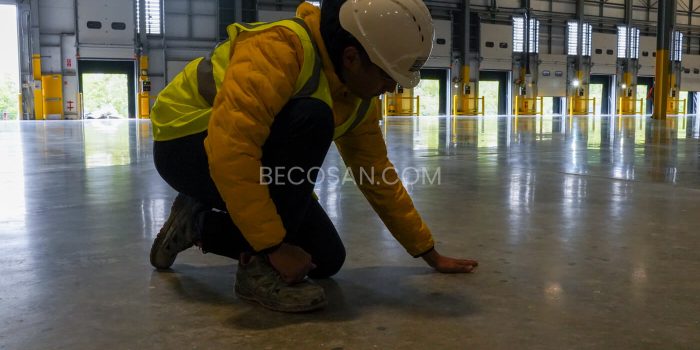
Before polishing, we repair cracks, voids and damaged joints using compatible polymer materials that integrate seamlessly with the polishing process.
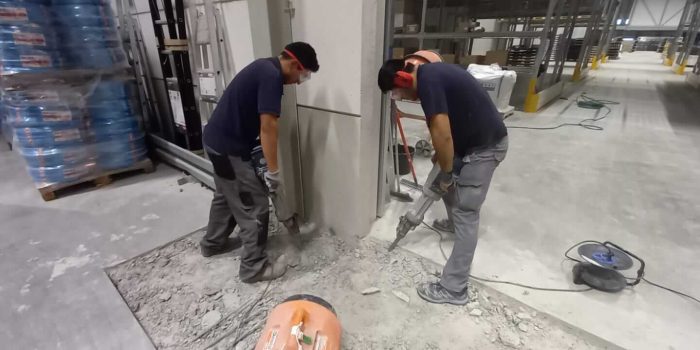
Uneven or damaged surfaces are corrected using industrial grinders to achieve uniformity before densification.
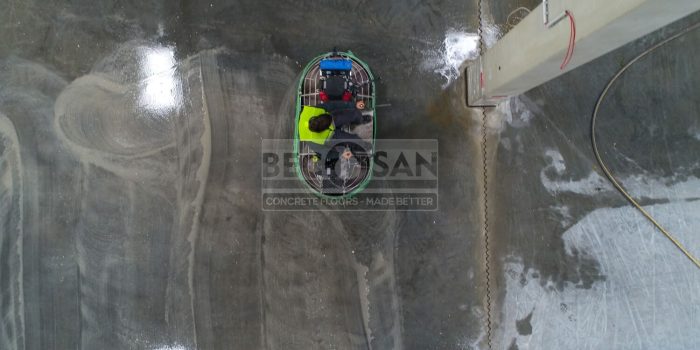
A lithium-based densifier is applied to penetrate deeply into the concrete pores. This reaction hardens the internal matrix, increasing surface strength and eliminating dusting.
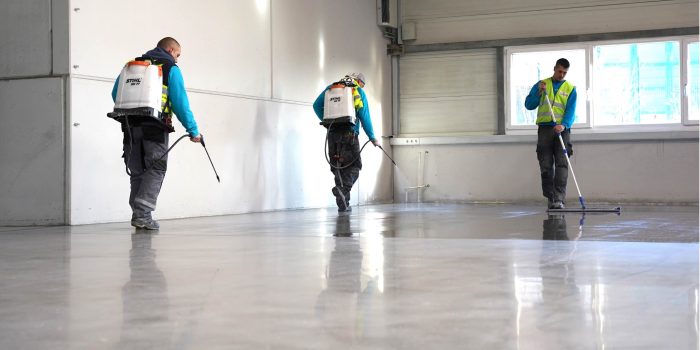
The floor is polished through multiple stages using progressively finer diamond abrasives until the desired level of gloss and surface density is achieved. During this process, a specialised BECOSAN® sealing compound is applied, which chemically bonds with the densified surface.
This final sealing stage enhances the floor’s resistance to staining, dust formation and abrasion, while maintaining its natural breathability and clean, reflective appearance.
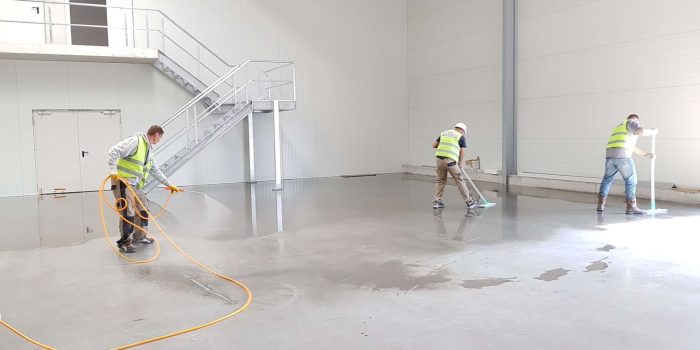
The BECOSAN® Polished Concrete floor meets all the necessary requirements of the automotive industry. And it also has the appropriate certifications for this sector.

Slip resistance tested according to DIN 51131 (method equivalent to Method C of EN 16165:2022)
Abrasion resistance tested under European industrial flooring standards.
No VOCs – compliant with BREEAM and LEED low-emission requirements.
Fully compatible with standard joint and flatness specifications for heavy-load industrial slabs.
No. BECOSAN® is designed for dry areas only. For constant exposure to oils or chemicals, a resin or PU-cement system is recommended.
No. When finished to the correct specification, it meets all UK and EU slip-resistance standards for dry industrial floors.
Properly maintained, the surface can last decades. A light re-polish may be done every 10–15 years if required, without removing the floor.
Work can be completed in phases, overnight or on weekends. Depending on site conditions, typical sections take 1–3 days.
Yes. We can fill cracks, rebuild joints and level damaged zones before treatment.
Standard BECOSAN® polished concrete is not conductive. If ESD flooring is required, a specialised system must be applied.
BECOSAN® provides automotive flooring services across the entire UK.
From initial surveys to complete installation, we work flexibly — night shifts, weekend phases, and full project planning to minimise downtime.
Contact us to request a free technical assessment or quotation.
We’ll review your site photos or drawings, and propose a cost-effective, long-term solution tailored to your facility.